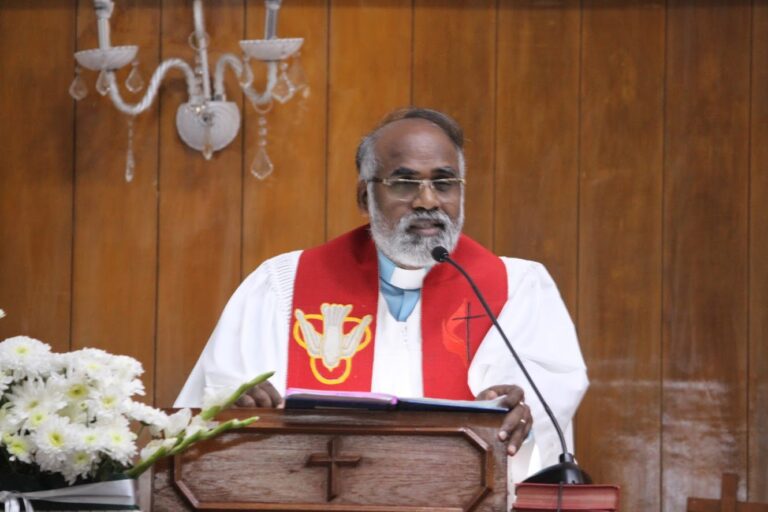
Message by the Senior Pastor
Rev. Dr. Andrew B. Natarajan

Dearly beloved in Christ,
Greetings in the wonderful name of our Lord Jesus Christ! Let us praise and thank God for the blessings of the past four months. As we step into another important month in the history of the church, let us focus our thoughts on the significance of Pentecost and the gifts, fruit, and ministry of the Holy Ghost.
Pentecost, derived from the Greek word Pentekoste meaning “the fiftieth,” marks a significant event in the Christian calendar. This celebration falls fifty days after the Paschal Feast, beginning from the sixteenth day of the Nisan Month. The fiftieth day, known as Pentecost, occurs on the sixth day of the Sivan month, typically at the end of May. (References: Exodus 23:16; 34:22; Leviticus 23:15, 23:22, Numbers 28).
The day was observed as a Sabbath day, all labour was suspended, and the people appeared before Yahweh to express their gratitude (Leviticus 23:21; Numbers 28:26). The central feature of the day was the presentation of two loaves of leavened, salted bread unto the Lord (Leviticus 23:17, 20; Exodus 34:22; Numbers 28:26; Deuteronomy 16:10). The size of each loaf was fixed by law. It must contain the tenth of an Ephah, about three quarts and a half, of the finest wheat flour of the new harvest (Leviticus 23:17). The Pentecost is the only one of the three great feasts mentioned in 2 Chronicles 8:13 as later observations. It was not mentioned as the memorial of events in the history of the Jews. The general character of the festival was that of a harvest-home celebration.
This Jewish festival obtained a new significance in the Christian church by the promised outpouring of the Holy Spirit (John 16:7, 13). The day of Pentecost is told in a marvellously vivid and dramatic way in the Acts of the Apostles as the day on which the Spirit descended upon the apostles, and on which day, under Peter’s preaching, so many thousands were converted in Jerusalem (Acts 2). There is a close parallel to the circumstances that had heralded the giving of the Law from Sinai and the gifts of the Holy Spirit at Pentecost (Exodus 19:16, Hebrews 12:18).
At Mount Sinai, the voice of God was heard in every language, reaching even the farthest listeners as clearly as those closest to the mountain. In part, Jerusalem mirrors its inhabitants’ diverse nature, representing a cosmopolitan hub. Additionally, some devout Jews from the Diaspora eventually made their way to Jerusalem, seeking to spend their remaining days near the Temple, enjoying its privileges, and ultimately being buried in the land of their fathers.
From a theological perspective, it is understood that Christ symbolized as the Passover lamb, was sacrificed. Fifty days later, God bestowed His Spirit upon the initial small group of disciples, who represented the first fruits of the emerging church (Acts 2:1-4, 1 Corinthians 5:7). However, we should joyfully recognize the presence of the Spirit of love, light, and power in every expression of grace, beauty, virtue, and goodness, whether occurring before or after the Incarnation.
Paul observed the season (Acts 20:16; 1 Corinthians 16:8), yet there’s no indication in the New Testament that the Church formally observed Pentecost as a festival. However, Church Father Tertullian recognized Pentecost as a Christian festival, becoming familiar and established by the 2nd Century. Today, Pentecost is not merely commemorated as a festival but embraced as a spiritual experience for the Church—a day of revival and preaching on powerful themes. Let’s eagerly await the Holy Spirit to revive us with His power and strength, guiding us forward in our mission.
(Ref: Smith Bible Dictionary, ISB Encyclopaedia, Bridgeway Bible Dictionary, and Dictionary of Bible Themes, Hastings’ Dictionary).
With Blessings
Rev. Dr. Andrew B Natarajan